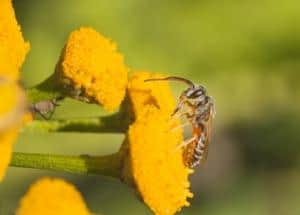Sweat bees are a common problem for many gardeners. Come summer, those small green insects will be flying all over your garden, and you’ll be wondering how to get rid of sweat bees for good. Here we’ll look into a complete guide on how to control and prevent sweat bees from infesting your garden, as well as the best products to get rid of them.
[amazon table=”15309″]
What are sweat bees?
Every summer gardeners face the problem of how to get rid of sweat bees: little green pests flying around with a heavy load of pollen on their back legs. From their name, you could guess that they are attracted to sweat, which, during a hot summer day in the garden, is difficult to avoid. Sweat bees become a real problem when they’re hovering in front of your face or landing on your arms and skin to drink your sweat. Do sweat bees sting? Yes, though thankfully it only leaves a small irritation.
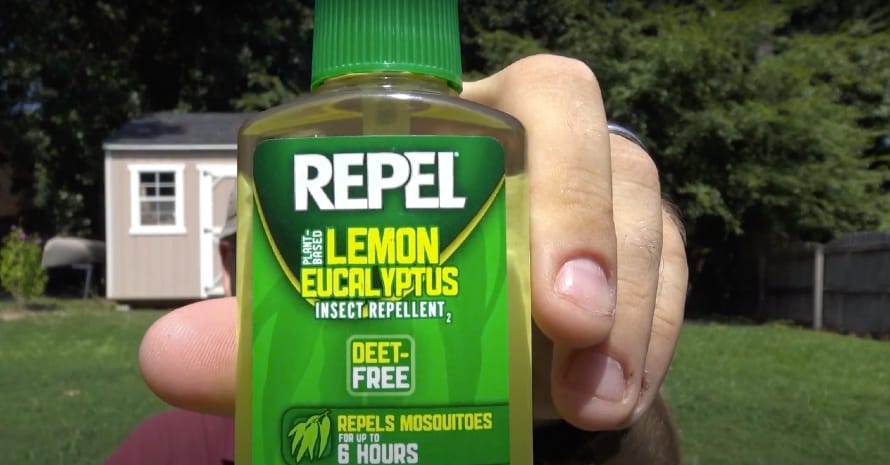
But what are they exactly? Sweat bees are also called Halictid Bees and come from a large insect family with more than 120 species that are incredibly important for pollinating plants. While some bees are specific about the plants that they choose to pollinate, sweat bees will pollinate anything and everything in their way. With the current situation around honeybees, insects like sweat bees are important to keep your garden blooming.
Sweat bees infestation 101
When you have lots of sweat bees nests you’re risking being swarmed by them in your every outing. Let’s look at the quick guide on how to identify sweat bees infestation and what risks it poses.
Quick sweat bees identification
It’s relatively easy to tell sweat bees apart from regular honey bees.
- Most of them have a green metallic to dull black sheen, their abdomen is purple or blue and their legs are furry.
- They are also smaller compared to regular bees, about ½ inch in size, and are very slender.
- Sweat bees, unlike honey bees, are often solitary and nest in the bare ground or deadwood.
Common sweat bees species (brief description)
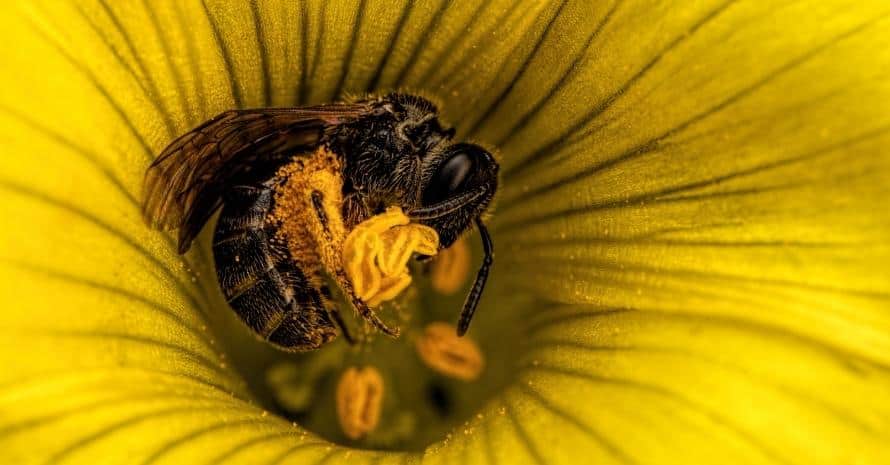
Halictid bees are a family that includes many types of bees. Among them are Small Miner Bees, Green Metallic Bees, Halictid Bees, Alkali Bees, Cuckoo Halictid Bees, and Sweat Bees.
Metallic sweat bees
They’re very easy to spot because of their bright metallic green color. Some of the metallic sweat bees are fully green in color, but some have brown and white stripes on their abdomen. These bees can be active all year round if it’s warm enough and are common to the South, specifically Florida.
Agapostemon
Those bees are mostly solitary ground nesters, though some might be making nests very close to one another. Females are iridescent green, but males have yellow and black stripes on their legs and abdomen.
Halictus
Like many others, halictus are small bees attracted to human perspiration. These bees can be solitary, communal, or social. In warmer climates, they have social ground nests, and in cool climates – solitary nests.
Cuckoo Halictid Bees
If every family has one annoying member, then this is the annoying cousin of the Halictid family. These bees, being cuckoos, don’t have their own nests and lay their eggs in the nests of other bees. They take over the cell of another bee, destroy its eggs and lay their own instead. While they go foraging for nectar, they don’t actually have any structures that let them collect pollen.
What attracts sweat bees?
If you keep asking yourself ‘why do sweat bees keep landing on me?’ in summer, the answer is quite simple. As you can guess from the name, human perspiration is a major attractor for these bees. They’re particularly attracted to the salt in human sweat that they don’t find in the pollen of flowers. However, they’re also attracted to a large variety of flowers. You name the flower – they’ll collect its pollen. The majority of the flowers that bloom in the gardens, meadows, and even pots attract these bees in summer, and they indiscriminately pollinate a variety of plants.
Sweat bees dangers
Generally speaking, sweat bees aren’t very dangerous but are incredibly annoying to humans. Do sweat bees bite? Only females of the species are able to sting. Sweat bees aren’t aggressive, but they can sting if they’re disturbed, which happens when humans try to fan them off and accidentally touch them.
Usually, the sting isn’t too dangerous, however, you should seek medical treatment if you have multiple stings, trouble breathing, or have a known bee allergy.
Sweat bees infestation signs
Because sweat bees nest in the ground or in the old wood, it’s possible to find the nest entrances in the ground or wood. It might be an excavated area around their cells and clusters of cells. The cells themselves might be lined with a wax-like substance.
A couple of sweat bees might not be a problem, however, if you see them in your yard in large numbers, it’s important to know how to get rid of sweat bees before they make your and your family’s life a nuisance.
How to Get Rid of Sweat Bees: Easy Extermination Guide
The main ways of getting rid of sweat bees are natural and chemical-based insecticides, repellants, and bees traps. However, sweat bees are very important natural pollinators, so as much as that is possible, you should look into ways of preventing their infestations and other ways of repelling them without necessarily killing sweat bees.
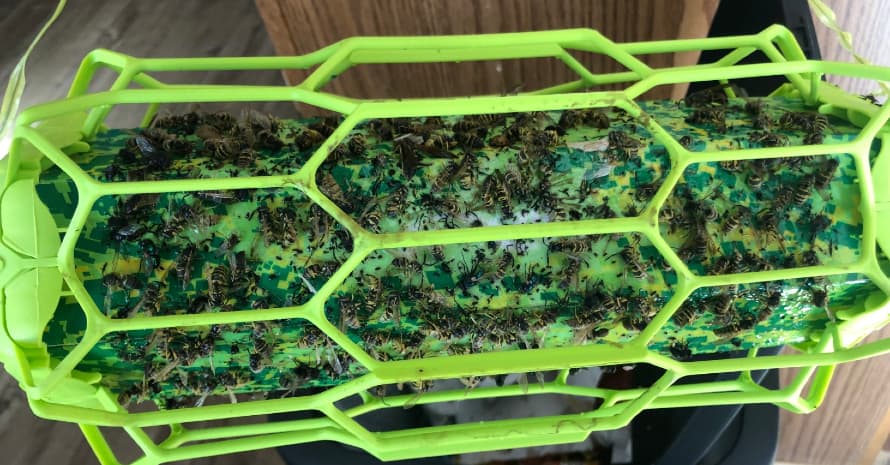
Inspect
Carefully inspect your property for the signs of sweat bees. You might identify the type of sweat bee by its color.
Female sweat bees carry pollen on their hind legs that have special hairs for attaching pollen. Males resemble females in a lot of ways, except they don’t have the hairs on their hind legs and sometimes have yellow-black striped abdomens.
Inspecting the species of the bees is very important to make sure they’re not endangered and whether you should obtain a permit to extinguish them.
Find their habitat
The majority of sweat bees nest in the ground in dry bare dirt, also often in rotting wood. Depending on the type, sweat bees could live alone or in colonies.
Begin by inspecting heaps of deadwood inside the soil, as those are the most common nesting places.
Prepare protective clothing
Do sweat bees sting and do you need to wear protective clothing? Although they rarely sting, unless they’re provoked, if you’re getting rid of their nests it’s important to wear proper protection.
It doesn’t mean that you should wear a full bee suit, but you should wear some long clothing that will protect your arms and legs, and a net that will protect your face. You could also use a bee repellent for protection.
Treat
The fastest way to get rid of the sweat bees is to use treatment.
Insecticides
If you are planning on killing sweat bees that have infested your garden plants, you should look for organic options. There are many organic sprays with natural ingredients. What kills sweat bees? Mint is the most important ingredient in the majority of organic sweat bees insecticides.
Set Bee Traps
Bee traps are an excellent way to get rid of sweat bees. Those can be purchased ready or made on your own. The way it works is quite simple: you put something sweet inside the trap that will attract the bees, and once they get in – they can’t get out of the small funnel-like opening.
Repellents
Protecting your skin from sweat bees is also important. This is a good option for not killing sweat bees but pushing them away from your proximity. Like many insect repellents, those exist in the form of sprays and ointments.
How to Prevent Sweat Bees?
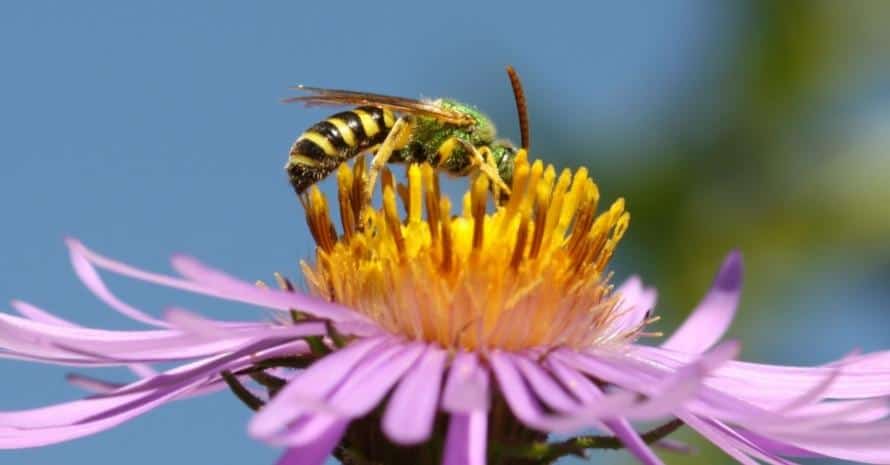
We already know what sweat bees like: salt in our sweat, open, well-lit ground, old wood, flowers, humidity. What they don’t like: mint, essential oils, proper ventilation.
This tells us not only how to kill sweat bees but how to prevent them from ever causing a problem.
- Mint is your best friend in sweat bees prevention. From growing it in pots to using mint rubs and oils/sprays – it can be a natural deterrent both for skin and surfaces.
- Plants and ground cover: if there is no open ground that they can use as a nesting spot, sweat bees won’t settle in your yard. Planting plants like sunflowers, honeysuckle, wisteria, and others, as well as using mulch and pebbles to cover your ground will prevent the sweat bees from infesting your property.
- Proper ventilation and personal hygiene: as far as it’s possible you should try to prevent humidity and perspiration that will attract the sweat bees.
Top 3 Best Sweat Bees Treatments
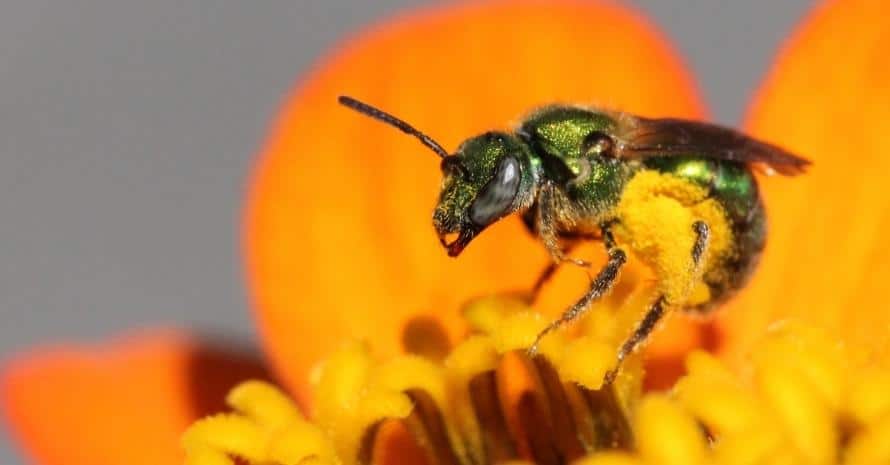
There are different ways of how to kill sweat bees and several products that will do so quickly and safely for you. Let’s look at my top picks of products.
1. Repel Plant-Based Insect Repellent
[amazon box=”B010AFV1LQ” template=”vertical”]
This spray insect repellent is made with essential oil of lemon and eucalyptus. It protects your skin if you’re outside for up to 6 hours. It’s deet-free and can be used on children. REPEL is a company that specializes in insect repellants, from mosquitoes to other insects.
[su_youtube_advanced url=”https://youtu.be/GH88T0d-UFY”]
What I like about this repellant is, first and foremost, a pleasant smell. Bug sprays always smell horrible, and most of the time by the time you’re finished applying it, you’re coughing and scrunching your nose away from it. This spray has a nice refreshing scent of natural oils. It also doesn’t leave greasy sticky skin afterward.
Natural ingredient-based repellents are rarely effective, but I’ve used this one over the years and found it really effective in protecting from sweat bees, though it does need to be reapplied on a particularly hot and humid summer day. It also comes in a pack of 2, so saves you a lot of money.
| Pros: | Cons: |
|
|
2. Mighty Mint Gallon Peppermint Oil
[amazon box=”B07TPBJBNB” template=”vertical”]
An excellent nontoxic natural spray that is particularly effective against sweat bees. Its main ingredient is highly concentrated mint oil, as well as other plant-based ingredients, so it’s not only effective but also doesn’t harm other plants.
Mighty Mint is known for its organic products for pest and insect control that they make with US-farmed peppermint.
The formula is incredibly concentrated and comes in a large 128 oz gallon, that you can pour in to make sprays and rubs for surfaces.
From all the products that I’ve used, this one got instant effects when I needed treatment for sweat bees. The fact that it’s 100% organic is excellent because it’s pet and child-safe.
| Pros: | Cons: |
|
|
3. RESCUE! TrapStik for Bees
[amazon box=”B07RT23SKN” template=”vertical”]
This bee trap uses a VisiLure technology that lures bees with appealing colors and multi-dimensional patterns. Once they’re attracted, they get stuck to the sticky surface. It doesn’t have agents that are killing sweat bees, instead, it lures them to the trap.
[su_youtube_advanced url=”https://youtu.be/lQuTKUm4yh0″]
I like that it’s very effective in killing sweat bees. Even when I had large infestations of them, it dealt with them perfectly. I also like that this trap has been designed in order to protect birds, bats, and other small animals as well as the fact that this is a US-made product with a long history of safely finding ways of how to get rid of sweat bees and other pests.
| Pros: | Cons: |
|
|
Conclusion: what kills sweat bees?
There are many effective ways of how to get rid of sweat bees: bee traps, repellents, and natural and chemical insecticides. Sweat bees are not aggressive by nature, but in large quantities, they can make your life and the life of your family unbearable in summer. The best way to deal with the problem is to prevent it, so use different plants that cover the soil and don’t let sweat bees build nests, as well as things like pebbles, mulch, and try to get rid of the old wood on your property.
Write about how you dealt with sweat bees in the comments and share your tips!
References
- Wisconsin Bee Identification Guide (Patrick Liesch, Christy Stewart, and Christine Wen)
https://hort.extension.wisc.edu/files/2016/08/WI-BEE-IDENTIFICATION-GUIDE.pdf - Sweat or Halictid Bees (University of Florida)
https://entnemdept.ufl.edu/creatures/misc/bees/halictid_bees.htm#dist

